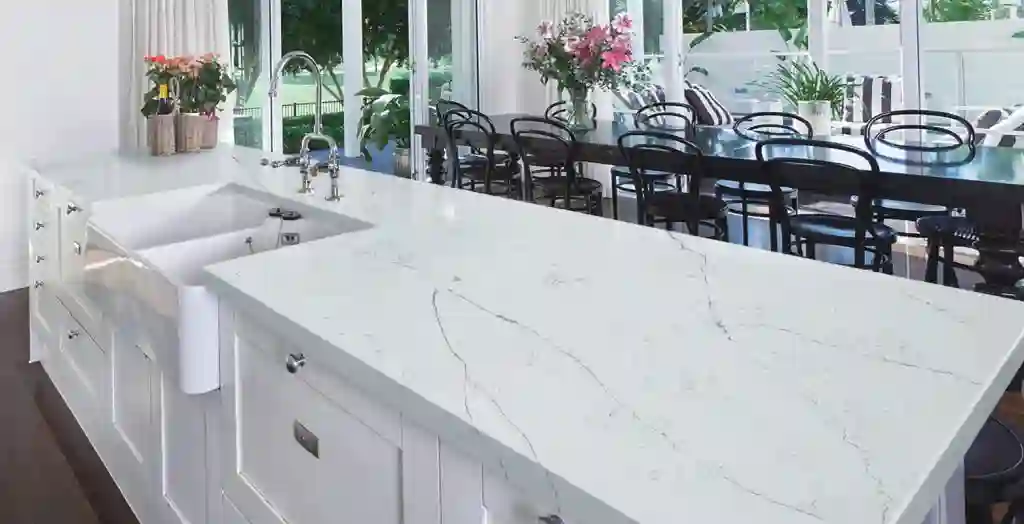Quartz kitchen countertops are of different types, each with its own unique qualities that make them stand out. These qualities also make them stand out among different stone countertops, including granite. They are also available in different colors, and some of the most common colors you’ll find are black, rich browns, warm creams, cool grays, and white colors. Another impressive thing is that quartz is also available in veining,which gives them the appearance of marble. What’s certain is that you can always find a suitable option, regardless of your preference.
Quartz countertops are engineered stones that are made from grounded particles that are bound by resins. If you’re thinking about getting quartz kitchen countertops for your home, you should read the interesting fact we have included at Granite Selection.
Quartz Countertops are not Solid Quartz
Most of the quartz countertops you’ll find have quartz present, but what you should note is that up to 10% of the quartz countertop is not stone at all. They are actually made of cement-based or polymeric binders. The remaining 90% comprises waste marble, granite, and recycled industrial wastes or natural stones like mirrors, glass, silica, and ceramic.
Sometimes, they actually contain quartz to an extent, but the main thing to note is that they are all held by a binder which gives the countertop the feel and looks of stone. In general, quartz countertops are compound stones or engineered stones because of how they are created. Today, the industry is growing at a fast pace, with more quartz countertops being created by the day.
All Quartz Countertops Flow From a Source
The technology used in creating engineered stone was developed in 1963 by the Breton company located in Northeast Italy. This company is licensed under the trademark Bretonstone®.
Today, the company now manufactures high-quality quartz countertops. The manufacturing process involves blending pulverized natural stone aggregate with polymers, followed by air removal, heating, and shaping the heated material into slabs. Basically, the slab usually has the appearance and hardness of natural stone.
The technology has continuously advanced ever since then, and today, there is now quartz that are made with glasses, including mirrors, brass metal fillings, and other mixtures of marble and granite.
Quartz Countertops are Eco-Friendly
In engineered stone countertops, 90% of the materials are made from stone, and they comprise the base of the countertops, and they are also waste byproducts of the manufacturing process and quarrying. Basically, no natural stone is solely quarried for utilization in quartz countertops.
Another thing to note is that the resins that make up for the 10% of quartz countertops are now less synthetic and more natural.
You Often Walk on Quartz
Many people only think that quartz is only present on their bathroom counters. However, quartz is also applied on floors, especially on commercial properties like shopping malls and other similar structures. Many have walked on quartz countertops, and they don’t even know about it. There are so many other ways quartz is applied today, and it’s not only limited to use on kitchen countertops.
Quartz No Longer Competes with Granite
For many years, quartz has been in active competition with natural stone, and the main point was in determining which to choose between granite and quartz kitchen countertops. Basically, quartz aimed to become less porous, easily fabricated, and more durable than granite. Today, quartz is rapidly growing in popularity, and there are so many variants on the market today.
Quartz is a Pricey Option
When compared with granite, quartz is generally a cheaper option. However, whencompared with options like butcher block, or laminate, it’s not a cheaper option. Quartz countertops generally cost between $15 to $70 per square foot, while granite costs between $15 to $140 per square foot. On the other hand, marble is a more expensive option, and it costs between $15 to $190 per square foot.
There are also many inexpensive options that cost cheaper than the aforementioned prices. Examples are laminate, which is between $8 to $27 per square foot, butcher block or wood, which is between $10 to $38 per square foot, and ceramic tiles or porcelain are also cheaper options that cost between $3 to $28 per square foot.
Quartz Has Excellent Durability
As mentioned earlier, quartz countertops are generally nonporous, and as such, they don’t need to be sealed like marble or granite. This also implies that they don’t get water stains. Another interesting thing is that quartz doesn’t easily scratch, unlike granite,which scratches a lot easier. However, when subjected to extreme pressure, it can chip, crack, or even scratch.
The interesting thing is that you can buff out light scratches on the surfaces of quartz countertops easily. However, it’s always best to avoid these scratches as much as you can rather than hoping to be able to clear out the scratches.

